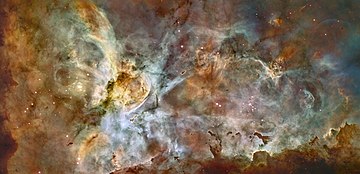Biocentrism and Cosmology
Biocentrism (from Greek: βίος, bios, “life“; and κέντρον, kentron, “center“) — also known as the biocentric universe — is a theory proposed in 2007 by American scientist Robert Lanza. In this view, life and biology are central to being, reality, and the cosmos — life creates the universe rather than the other way around. Biocentrism asserts that current theories of the physical world do not work, and can never be made to work, until they fully account for life and consciousness.
Lanza’s biocentric theory builds on quantum physics. While physics is considered fundamental to the study of the universe, and chemistry fundamental to the study of life, biocentrism places biology before the other sciences to produce a theory of everything.
Reception of Lanza’s theory has been mixed. Critics have questioned whether the theory is falsifiable. Lanza has argued that future experiments, such as scaled-up quantum superposition, will either support or contradict the theory.

Theory
Lanza argues that the primacy of consciousness features in the work of Descartes, Kant, Leibniz, Berkeley, Schopenhauer, and Bergson. He sees this as supporting the central claim that what we call space and time are forms of animal sense perception, rather than external physical objects. Lanza argues that biocentrism offers insight into several major puzzles of science, including Heisenberg’s uncertainty principle, the double-slit experiment, and the fine tuning of the forces, constants, and laws that shape the universe as we perceive it. According to a Discover magazine article adapted from Lanza’s book, “biocentrism offers a more promising way to bring together all of physics, as scientists have been trying to do since Einstein’s unsuccessful unified field theories of eight decades ago.”
Lanza’s theory of biocentrism has seven principles:
1) What we perceive as reality is a process that involves our consciousness. An “external” reality, if it existed, would by definition have to exist in space. But this is meaningless, because space and time are not absolute realities but rather tools of the human and animal mind.
2) Our external and internal perceptions are inextricably intertwined. They are different sides of the same coin and cannot be divorced from one another.
3) The behavior of subatomic particles, indeed all particles and objects, is inextricably linked to the presence of an observer. Without the presence of a conscious observer, they at best exist in an undetermined state of probability waves.
4) Without consciousness, “matter” dwells in an undetermined state of probability. Any universe that could have preceded consciousness only existed in a probability state.
5) The structure of the universe is explainable only through biocentrism. The universe is fine-tuned for life, which makes perfect sense as life creates the universe, not the other way around. The “universe” is simply the complete spatio-temporal logic of the self.
6) Time does not have a real existence outside of animal-sense perception. It is the process by which we perceive changes in the universe.
7) Space, like time, is not an object or a thing. Space is another form of our animal understanding and does not have an independent reality. We carry space and time around with us like turtles with shells. Thus, there is no absolute self-existing matrix in which physical events occur independent of life.
The Evolution of our Worldview
In astronomy, the geocentric model (also known as geocentrism, or the Ptolemaic system), is the superseded theory that the Earth is the center of the universe, and that all other objects orbit around it.

Heliocentrism, or heliocentricism, is the astronomical model in which the Earth and planets revolve around a stationary Sun at the center of the universe. Historically, heliocentrism was opposed to geocentrism, which placed the Earth at the center. The Vatican files suggest that Galileo was forbidden to teach heliocentrism in any way whatsoever, but whether this ban was known to Galileo is a matter of dispute.

In philosophy, idealism is the family of views which assert that reality, or reality as we can know it, is fundamentally mental, mentally constructed, or otherwise immaterial. Epistemologically, idealism manifests as a skepticism about the possibility of knowing any mind-independent thing. As an ontological doctrine, idealism goes further, asserting that all entities are composed of mind or spirit. Idealism thus rejects physicalist and dualist theories that fail to ascribe priority to the mind. Monistic idealism holds that consciousness, not matter, is the ground of all being. It is monist because it holds that there is only one type of thing in the universe and idealist because it holds that one thing to be consciousness.
Biocentrism is a monistic idealistic theory.
Links: